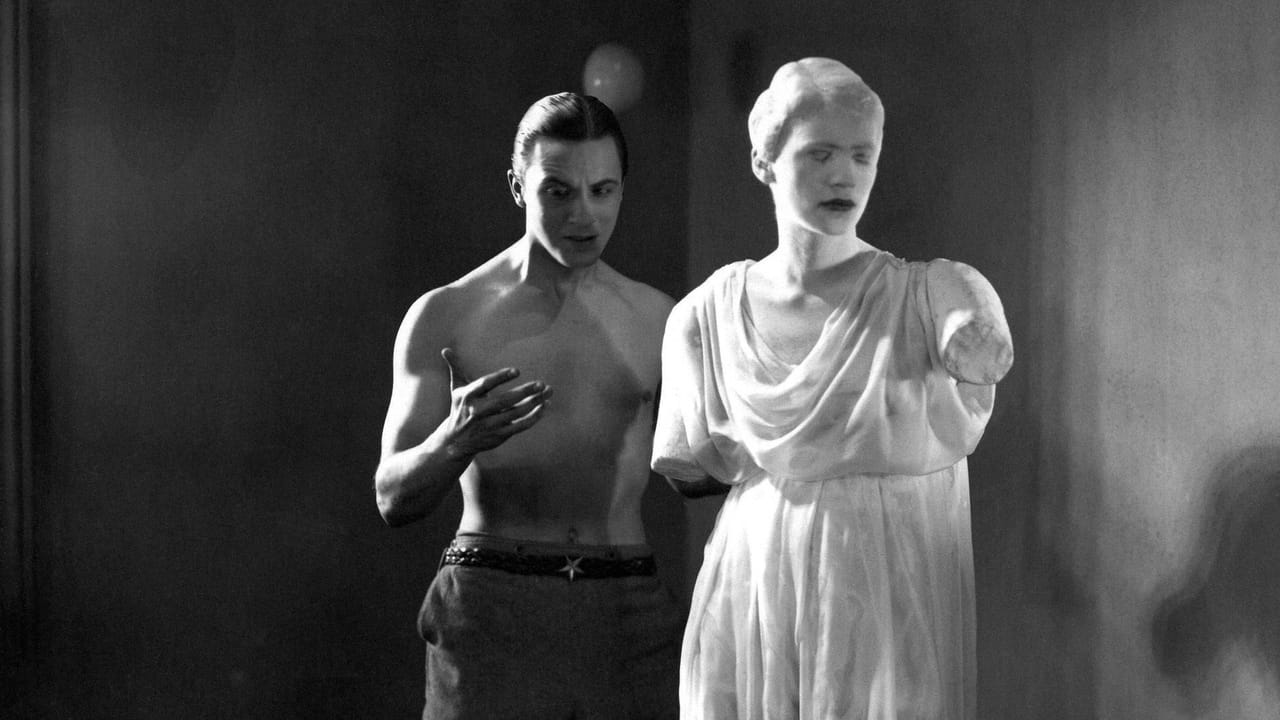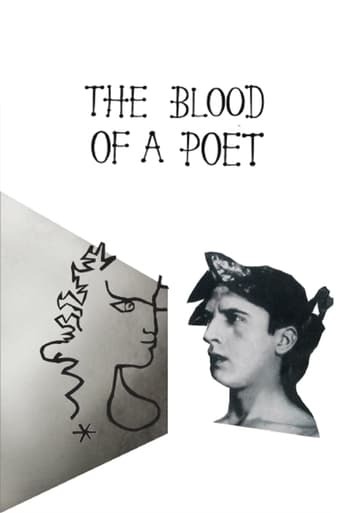



I really don't get the hype.
everything you have heard about this movie is true.
View MoreClever and entertaining enough to recommend even to members of the 1%
View MoreThe thing I enjoyed most about the film is the fact that it doesn't shy away from being a super-sized-cliche;
View MoreSpoiler Alert -- This appeared to portray a young man's suppression of his own sexuality.I was instantly sucked in to the exploration of his own identity.Standing half-nude, drawing a portrait of himself.Being sucked into a mirror (himself).Delving into bizarrely imaged fragments of his past.The scene with all the young boys fighting.The death of his true self.The emergence of a statue, immortal. Which was portrayed as a woman.-- This is what I grasped from the movie.I highly recommend, if you are into surrealism.10/10
View MoreI was dubious about Cocteau as a filmmaker since, as a poet, he was one of those laughably bad frauds that the decadent inter-war years of Europe produced, trying to be Surreal, when all that really meant was his writing was puerile, half-hearted, and soaked with clichés. He loathed the king of the Surrealists, Andre Breton, whom he sought to displace, and their antagonism has gotten both bad writers more play than anything either ever wrote did. So, it was no surprise that Cocteau's initial filmic offering was as bad- or worse, as his verse. Perhaps the only valuable thing that such a pretentious, self-conscious, hodgepodge can offer is some historical continuity with and context for later student arts films and the Warhol Factory films of the 1960s, which were, it should be stated, far more evocative with far less attempted. As 'art', though, Cocteau's film is virtually worthless.Apologists claim that such a film is beyond like or dislike or good or bad, but having recently watched Werner Herzog's early Even Dwarfs Started Small, a film that really fits that description, I can say that The Blood Of A Poet is not like that film at all because Herzog's film a) presented itself as art, b) was not a vanity project, and c) was well made- despite a limited budget. Cocteau's film was amateurish, even for its day. Silent filmmakers had done wonders on screen that dwarfed what Cocteau did- even if a budget limited him. Instead, Cocteau was content to take the lazy way out, tossing meaningless faux symbolism at the screen, so the viewer does all the work the lazy artist refuses to do. This is an old and tiresome tactic many bad artists employ, and makes the film definitively a work of bad art, if art at all . The truth is that this film feels more like a rejected Monty Python or early Saturday Night Live skit, or something that, were it not for its dogged and pretentious defenders, would make great fodder for the old Mystery Science Theater 3000 crowd. Yes, the poseurs (you know who they are) will masturbate over this unabated tripe, but even worse than its pretentiousness and banality is that the film is just plain old dull, as in BORING! One need only look to America, a few years earlier, to see the silent films of Buster Keaton, to get a sense of a true Surrealist filmmaker who learned to tame that tendency into real storytelling- i.e.- have a philosophy serve a greater purpose than its mere claims. Having long known and loved Keaton, I can state, definitively, that Jean Cocteau is no Buster Keaton. After watching The Blood Of The Poet I'd even settle for this film and its maker being Diane Keaton. Ah, such things that dreams are made of.
View MoreThough my experience is undoubtedly limited, I'm not usually a fan of surrealism or experimental cinema, usually dismissing them as exercises in pointlessness. However, my duty as a film buff tempted me to try my hands at Jean Cocteau's "Orphic trilogy", starting with 'Le Sang d'un poète / The Blood of a Poet (1930) {the remaining two films are, of course, 'Orpheus (1950)' and 'The Testament of Orpheus (1960)'}. Luckily the film was rather short, because I can't say that on first viewing, at least I got much out of it. There is certainly some very interesting imagery, and Cocteau has fun making use of his visual trickery {I particularly liked how the poet fell through the mirror}, but, once the hour was over, I simply didn't feel any more entranced, inspired or shocked than I had been prior to watching the film. Call it inexperience if you must, but I just didn't "get" what the film was trying to communicate, if anything at all.As a random collection of bizarre and occasionally-invigorating images, 'The Blood of a Poet' works to a certain extent, but, if it ever aimed to shock its audiences, the effect is never anything to rival its surrealistic contemporaries, mostly notably Luis Buñuel's 'Un chien andalou / An Andalusian Dog (1929).' In Cocteau's keen eye for mind-tripping camera-work, there is certainly merit, though I doubt that the mere inventiveness of the visuals is the reason why the film is held in such reverence. Is the film simply a collection of random episodes designed to evoke an emotional response, or is there a deeper subtext that I'm overlooking? One interesting theory is that 'The Blood of a Poet' depicts the suffering of a poet, of an artist, and how this immense suffering is transformed into a work of art, something truly beautiful {one particular sequence supports this hypothesis, as a young girl responds to her cruel maltreatment by learning to fly}.However, beyond this primitive inkling of a theory, I find myself thoroughly baffled by the events depicted in the film, which largely strike me as being random. In an essay he wrote about his film {included with the excellent Criterion Collection DVD}, Cocteau states that 'The Blood of a Poet' draws nothing from dreams or symbols, but that it, "as far as the former are concerned initiates their mechanism, and by letting the mind relax, as in sleep, it lets memories entwine, move and express themselves freely. As for the latter, it rejects them, and substitutes acts, or allegories of these acts, that the spectator can make symbols of if he wishes." The precise meaning of these words still eludes me, but it sounds as though the director didn't ever intend for the film to make any sense, and that it is up to the audience to derive their own greater meaning from the collection of sounds and images. Maybe Cocteau knew exactly what he was doing, or maybe he just managed to convince us that he did.
View MoreJean Cocteau's first film subject- Blood of a Poet (episodes 1-4), all takes place between a second's worth of measurement in time. A chimney falls to the ground in a scene of pure demolishment, and for the more mysterious glimpses in the film we see them happening in a second's flash as well (if you blink you'll miss it).Before I saw Blood of a Poet, I figured it would be a debut Cocteau attempting a Bunuel type of filmic showcase of a different, though somewhat simple story with anarchic, subversively funny dream shots of a purely surreal nature. Then, there is the first shot, the opening image of the man, the introducer, like a ghost or a character in a Greek tragedy. The first episode is "Wounded Hand of the Scars of the Poet". Right from the music a viewer can realize Cocteau's picture is apart from Bunuel's achievement(s). The latter has a technique of classical music (Wagner over a scene of imposed seduction, for example) while Cocteau has the music as inviting, jubilant, even, however all the wigged man is doing is painting a face. It's almost like a cartoon, and for a fleeting instant, the face on the painting has lips that move. This is more than the usual surrealistic stoke of the brush- this is the first sign in motion picture history of an artist (i.e. painter) converting ideas into an episodic format. The purpose is the same- abstract thinking- but the format is of a different mind-set.That's the first episode, that gets the viewer in, as another wigged man enters- sort of shocked- and exits like the wind. A wire face spins and the lips moving again like the painting he created just before. It could be the illusion of a lifetime, or a trick of the white light seeping out of the crevices in the lips in his hand, but the man, like us, can't ignore it until it is no more. That Cocteau has an intended poetic voice here in his brand of surrealism is a bonus of sorts to the intellectual type of audience member. And, it's not a downer to those who might not be interested in a filmmaker's ego- the artistry overcomes the ego, for the most-part anyway. The second episode is titled "Do Walls Have Ears?", when the artist gets rid of the mouth, but now the man, the artist, is trapped in the room with the statue as the guardian. This is the first sign of the instantly narcissistic mood of Cocteau in the statue, a director in and of itself delivering enigmatic, haunting statement the mirror, again, shows with narcissism- the necessary narcissism, the kind to know one's self AND how he falls within himself like water. As the artist goes through the abyss, he winds up at the hotel (right in-between this Cocteau throws in a cut-away of a man disappearing after appearing for a number of seconds, creepy in its non-sense). Then, the artist views an execution through a key-hole in a door. (Oh, did I mention that some of the dialog is quite possibly backwards- otherwise, what else could be the explanation of the point of it, except for random gibberish?)Themes of suicide come up, then, soon enough after, the artist tires of this to the point of him leaving, climbing on the walls. At the end of this totally hypnotic two-parter, we see the reason, at the last for a clear instant, his emotion is now purely terror (by breaking the mirror, Cocteau tries to break through his own narcissistic tendencies). The 3rd and 4th episodes are another kind of two-parter, and they center on a snowball fight and a card game, respectively. "The snowball fight" is entirely representative of the (true) brutal, near-primitiveness of the realities that go with childhood, leading up to a battered snowball victim at the side of an elegant man and woman dealing a game with each other. Suddenly, during this ("The Profanation of the Host" as it's appropriately titles) surrealism is at an astonishing height for its time. One shot, in particular, seemed to be an inspiration for a part of the Jupiter landing in 2001. A card is lifted from the boy, an assist in the game, and the man ends up losing, the boy (and the black man) revealing disgust in the elegance of the situation of the game. That's when it hit me, the message of Blood of a Poet. Behind beauty, as well as behind one's own desires and vision, even if we can't entirely explain why it's beautiful or why we hold these desires for ourselves is the darkness that beckons (perhaps in the slightest of moments of our lives) in our deepest, most assuredly dream-like delusions of grandeur. From this, you could gather, Blood of a Poet seems like it may not be for everyone, certainly not for those who can't even remember one dream from their entire life (personally I thought it contained inklings of pretentious gobledy-gook). But its nature is something to look for, and if you only see the movie once, you might not be sorry. Grade: A
View More